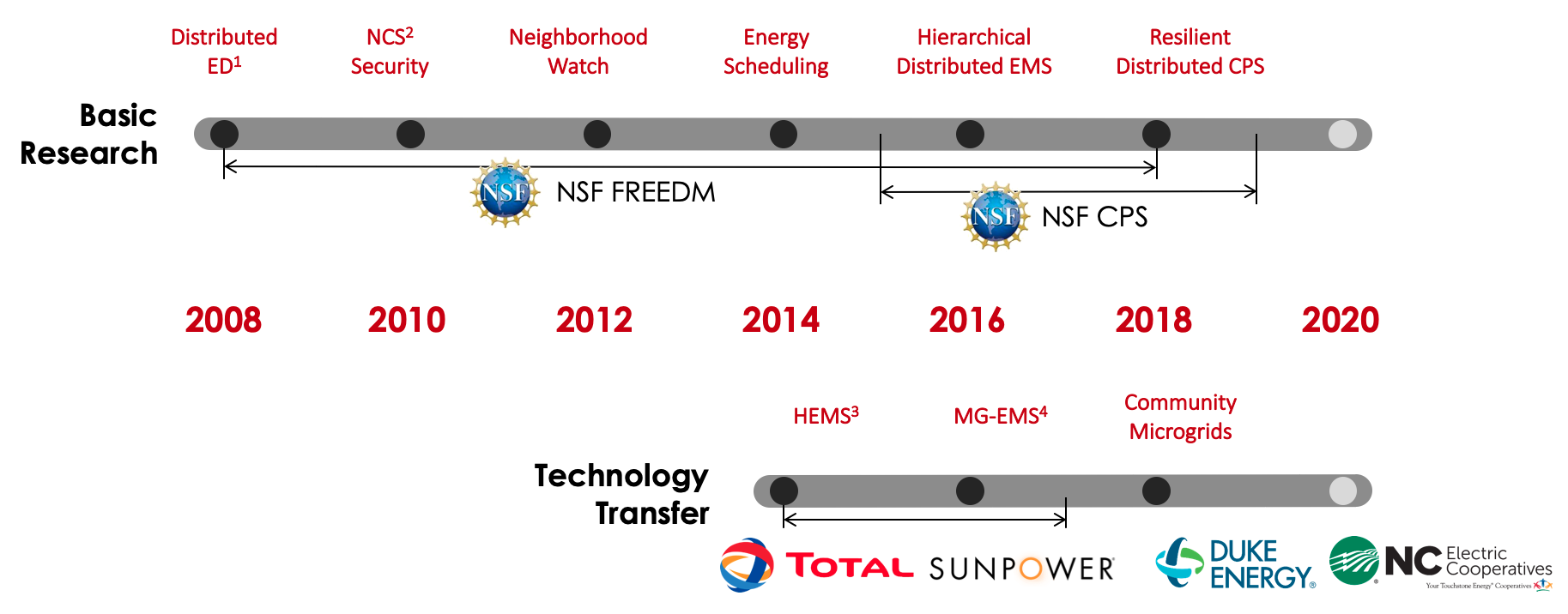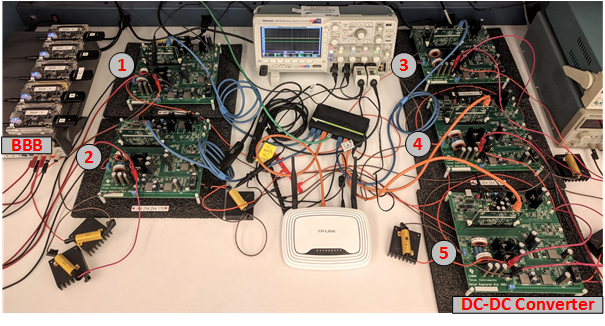Collaborative Distributed Energy Management Systems
Personnel:
Mo-Yuen Chow (PI), Ziang Zhang, Wente Zeng, Navid Rahbari Asr, Yuan Zhang, Jie Duan, Alberto Castelo Becerra, and Zheyuan Cheng.
Objective:
To enhance the microgrid/smart grid’s scalability, reliability, and resilience, this project aims to develop a collaborative and distributed energy management system (CoDEMS) that can determine globally optimal control commands without the need for a central coordinator.
Funding:

Summary:
The core of CoDEMS is a rolling-horizon optimization that set both the day-ahead optimal schedule and 5-min re-dispatch commands. By leveraging the consensus-based distributed optimization technique, the above mentioned global optimization can be solved by DER on-site controllers. Current results indicates that the proposed distributed control framework delivers not only the same control functions as the centralized framework but also greater scalability, reliability, and resiliency.
Timeline:

Results:
The CoDEMS algorithm is successfully developed and its intellectual merits, approaches, results, and contributions are well documented in 36 journal and 64 conference publications. In addition to publications, the CoDEMS is also implemented in the ADAC lab and demonstrated on the FREEDM GEH testbed as shown in Figure 1 and 2 respectively.
CODEMS Lab Implementation:

CODEMS GEH Implementation:

Impacts:
The proposed CoDEMS distributed control framework is a key enabling technology for integrating the ever-growing DERs. As the distributed controllers maximize the utilization of these DERs and, therefore, reduce the system operation costs, investors are motivated to deploy more residential-scale renewable energy resources and DERs. As a result, the proposed technology breaks the bottleneck of the DER integration and take the U.S. one step further towards the zero-carbon energy future. Furthermore, the proposed collaborative distributed framework fosters the resilience of the distribution grid. The system leverages the controller redundancy to sustain the critical system functionalities under abnormal operating conditions, e.g. climate disasters, device failures, and misbehaving agents.
Key References:
[1] Z. Cheng, J. Duan, and M. Chow, “To Centralize or to Distribute: That Is the Question: A Comparison of Advanced Microgrid Management Systems,” IEEE Industrial Electronics Magazine, vol. 12, no. 1, pp. 6–24, Mar. 2018.
[2] J. Duan and M. Chow, “A Resilient Consensus-Based Distributed Energy Management Algorithm against Data Integrity Attacks,” IEEE Transactions on Smart Grid, pp. 1–1, 2018.
[3] Y. Zhang, N. Rahbari-Asr, J. Duan, and M. Chow, “Day-Ahead Smart Grid Cooperative Distributed Energy Scheduling With Renewable and Storage Integration,” IEEE Transactions on Sustainable Energy, vol. 7, no. 4, pp. 1739–1748, Oct. 2016.
[4] N. Rahbari-Asr, U. Ojha, Z. Zhang, and M. Chow, “Incremental Welfare Consensus Algorithm for Cooperative Distributed Generation/Demand Response in Smart Grid,” IEEE Transactions on Smart Grid, vol. 5, no. 6, pp. 2836–2845, Nov. 2014.